Critical Reflections of Ethical Issues
VerifiedAdded on 2022/11/30
|9
|1926
|93
AI Summary
This research aims to analyze the influence of corporate culture on employee satisfaction in the UK, specifically focusing on Amazon. The objectives include exploring factors considered in corporate culture, identifying the impact of adverse corporate culture on employee satisfaction, and determining ways to enhance employee satisfaction within Amazon. The research methodology involves a deductive approach, descriptive research design, and the use of primary and secondary research methods. Ethical considerations such as respect for autonomy, scientific integrity, social responsibility, and maximizing benefit while minimizing harm are discussed.
Contribute Materials
Your contribution can guide someone’s learning journey. Share your
documents today.
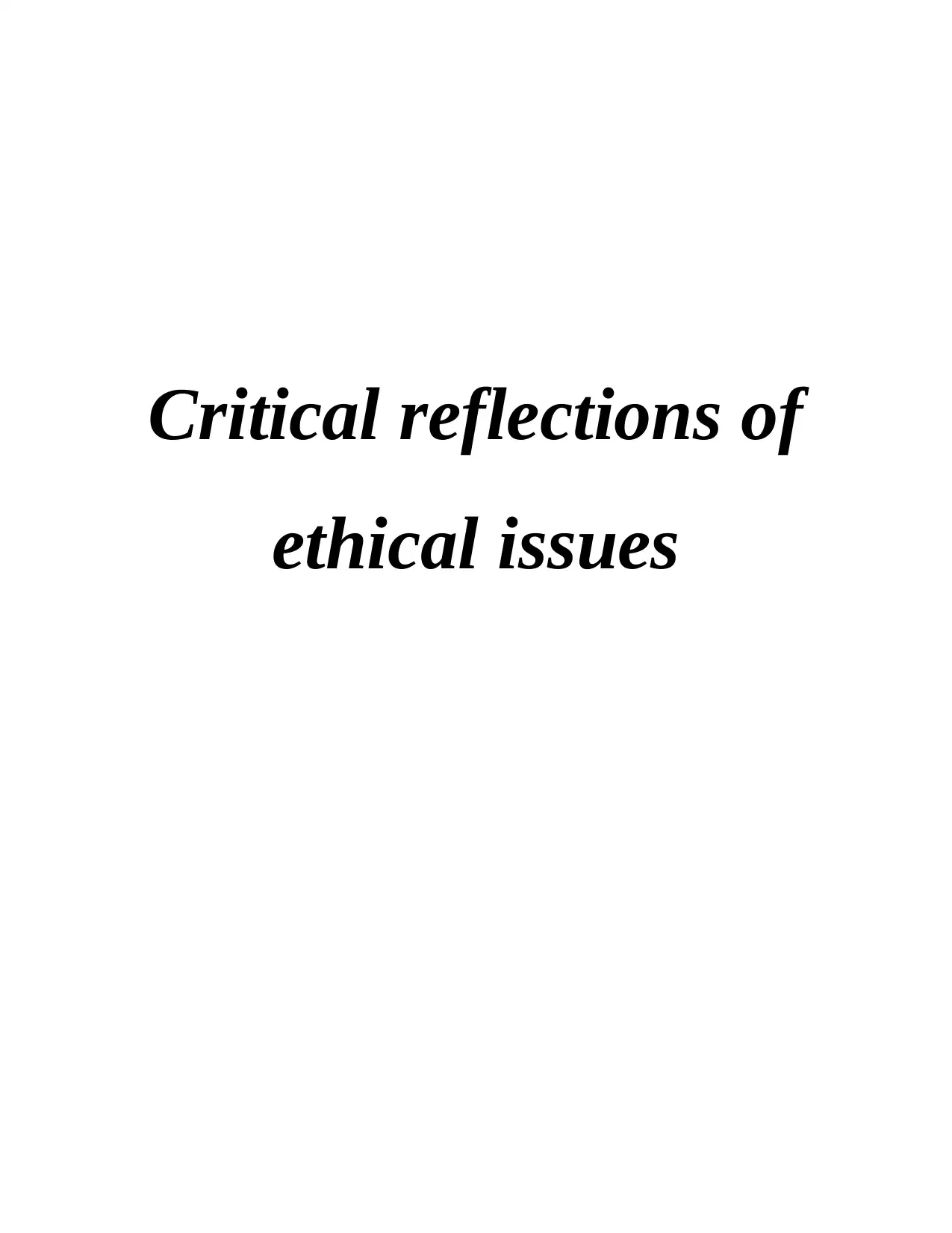
Critical reflections of
ethical issues
ethical issues
Secure Best Marks with AI Grader
Need help grading? Try our AI Grader for instant feedback on your assignments.
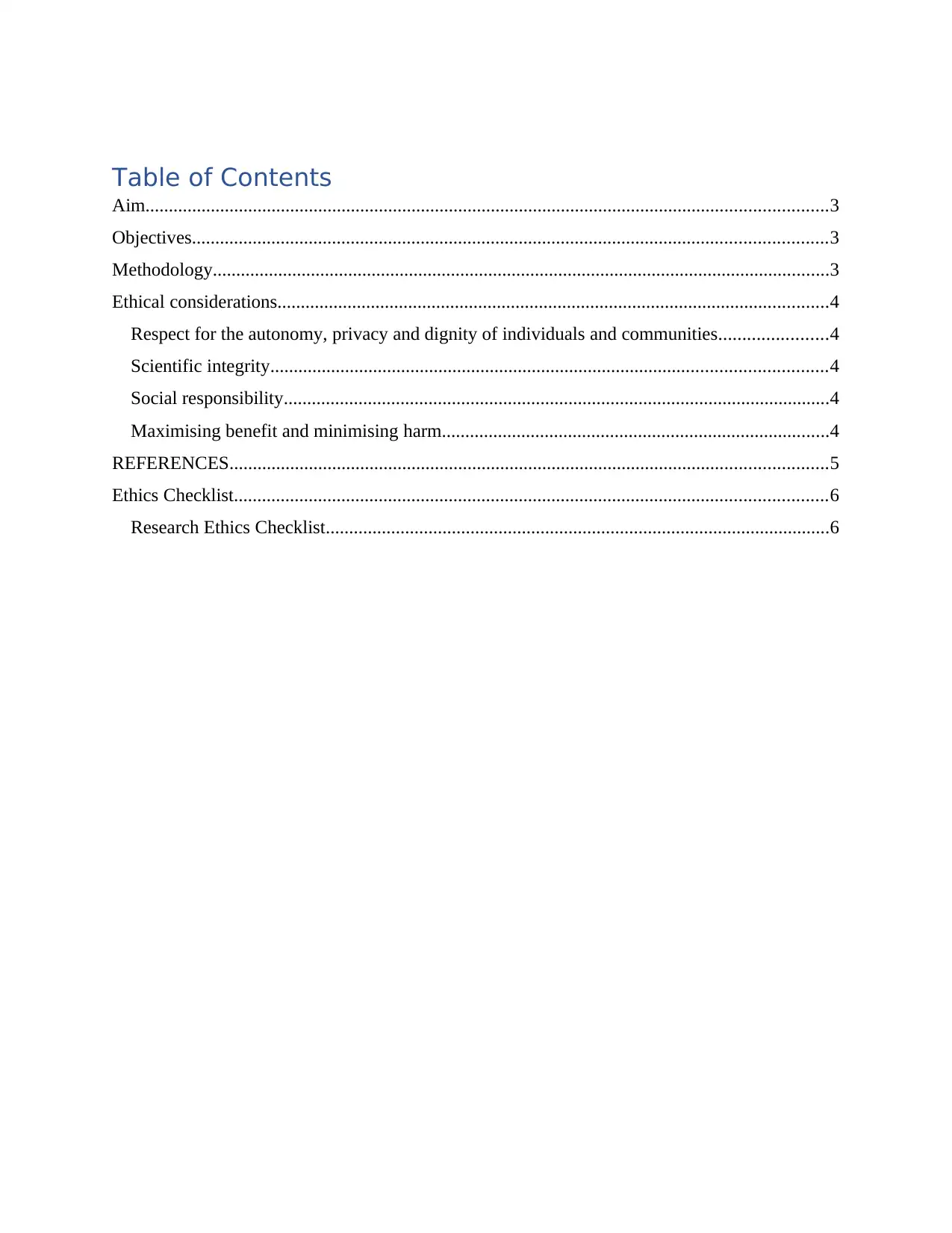
Table of Contents
Aim..................................................................................................................................................3
Objectives........................................................................................................................................3
Methodology....................................................................................................................................3
Ethical considerations......................................................................................................................4
Respect for the autonomy, privacy and dignity of individuals and communities.......................4
Scientific integrity.......................................................................................................................4
Social responsibility.....................................................................................................................4
Maximising benefit and minimising harm...................................................................................4
REFERENCES................................................................................................................................5
Ethics Checklist...............................................................................................................................6
Research Ethics Checklist............................................................................................................6
Aim..................................................................................................................................................3
Objectives........................................................................................................................................3
Methodology....................................................................................................................................3
Ethical considerations......................................................................................................................4
Respect for the autonomy, privacy and dignity of individuals and communities.......................4
Scientific integrity.......................................................................................................................4
Social responsibility.....................................................................................................................4
Maximising benefit and minimising harm...................................................................................4
REFERENCES................................................................................................................................5
Ethics Checklist...............................................................................................................................6
Research Ethics Checklist............................................................................................................6
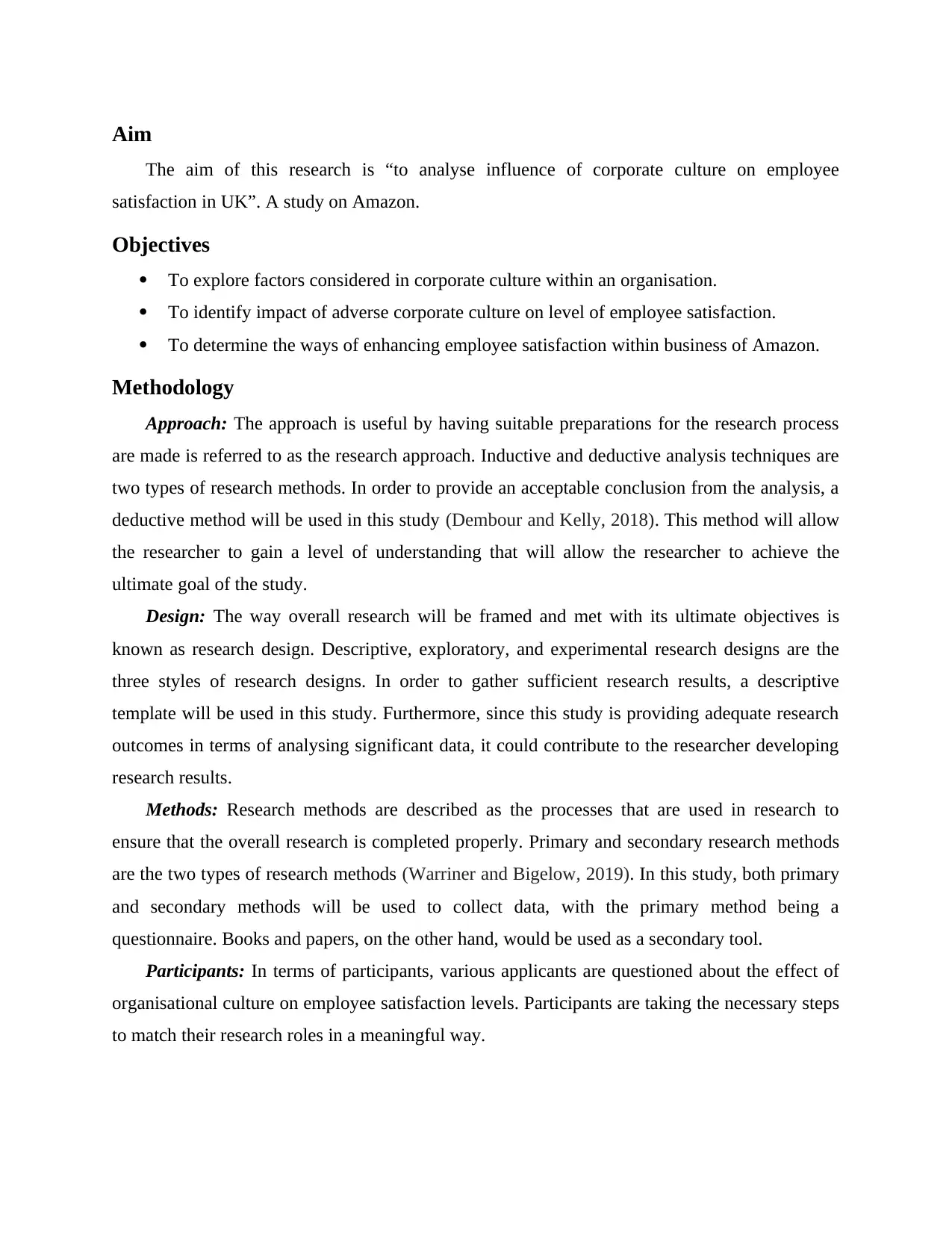
Aim
The aim of this research is “to analyse influence of corporate culture on employee
satisfaction in UK”. A study on Amazon.
Objectives
To explore factors considered in corporate culture within an organisation.
To identify impact of adverse corporate culture on level of employee satisfaction.
To determine the ways of enhancing employee satisfaction within business of Amazon.
Methodology
Approach: The approach is useful by having suitable preparations for the research process
are made is referred to as the research approach. Inductive and deductive analysis techniques are
two types of research methods. In order to provide an acceptable conclusion from the analysis, a
deductive method will be used in this study (Dembour and Kelly, 2018). This method will allow
the researcher to gain a level of understanding that will allow the researcher to achieve the
ultimate goal of the study.
Design: The way overall research will be framed and met with its ultimate objectives is
known as research design. Descriptive, exploratory, and experimental research designs are the
three styles of research designs. In order to gather sufficient research results, a descriptive
template will be used in this study. Furthermore, since this study is providing adequate research
outcomes in terms of analysing significant data, it could contribute to the researcher developing
research results.
Methods: Research methods are described as the processes that are used in research to
ensure that the overall research is completed properly. Primary and secondary research methods
are the two types of research methods (Warriner and Bigelow, 2019). In this study, both primary
and secondary methods will be used to collect data, with the primary method being a
questionnaire. Books and papers, on the other hand, would be used as a secondary tool.
Participants: In terms of participants, various applicants are questioned about the effect of
organisational culture on employee satisfaction levels. Participants are taking the necessary steps
to match their research roles in a meaningful way.
The aim of this research is “to analyse influence of corporate culture on employee
satisfaction in UK”. A study on Amazon.
Objectives
To explore factors considered in corporate culture within an organisation.
To identify impact of adverse corporate culture on level of employee satisfaction.
To determine the ways of enhancing employee satisfaction within business of Amazon.
Methodology
Approach: The approach is useful by having suitable preparations for the research process
are made is referred to as the research approach. Inductive and deductive analysis techniques are
two types of research methods. In order to provide an acceptable conclusion from the analysis, a
deductive method will be used in this study (Dembour and Kelly, 2018). This method will allow
the researcher to gain a level of understanding that will allow the researcher to achieve the
ultimate goal of the study.
Design: The way overall research will be framed and met with its ultimate objectives is
known as research design. Descriptive, exploratory, and experimental research designs are the
three styles of research designs. In order to gather sufficient research results, a descriptive
template will be used in this study. Furthermore, since this study is providing adequate research
outcomes in terms of analysing significant data, it could contribute to the researcher developing
research results.
Methods: Research methods are described as the processes that are used in research to
ensure that the overall research is completed properly. Primary and secondary research methods
are the two types of research methods (Warriner and Bigelow, 2019). In this study, both primary
and secondary methods will be used to collect data, with the primary method being a
questionnaire. Books and papers, on the other hand, would be used as a secondary tool.
Participants: In terms of participants, various applicants are questioned about the effect of
organisational culture on employee satisfaction levels. Participants are taking the necessary steps
to match their research roles in a meaningful way.
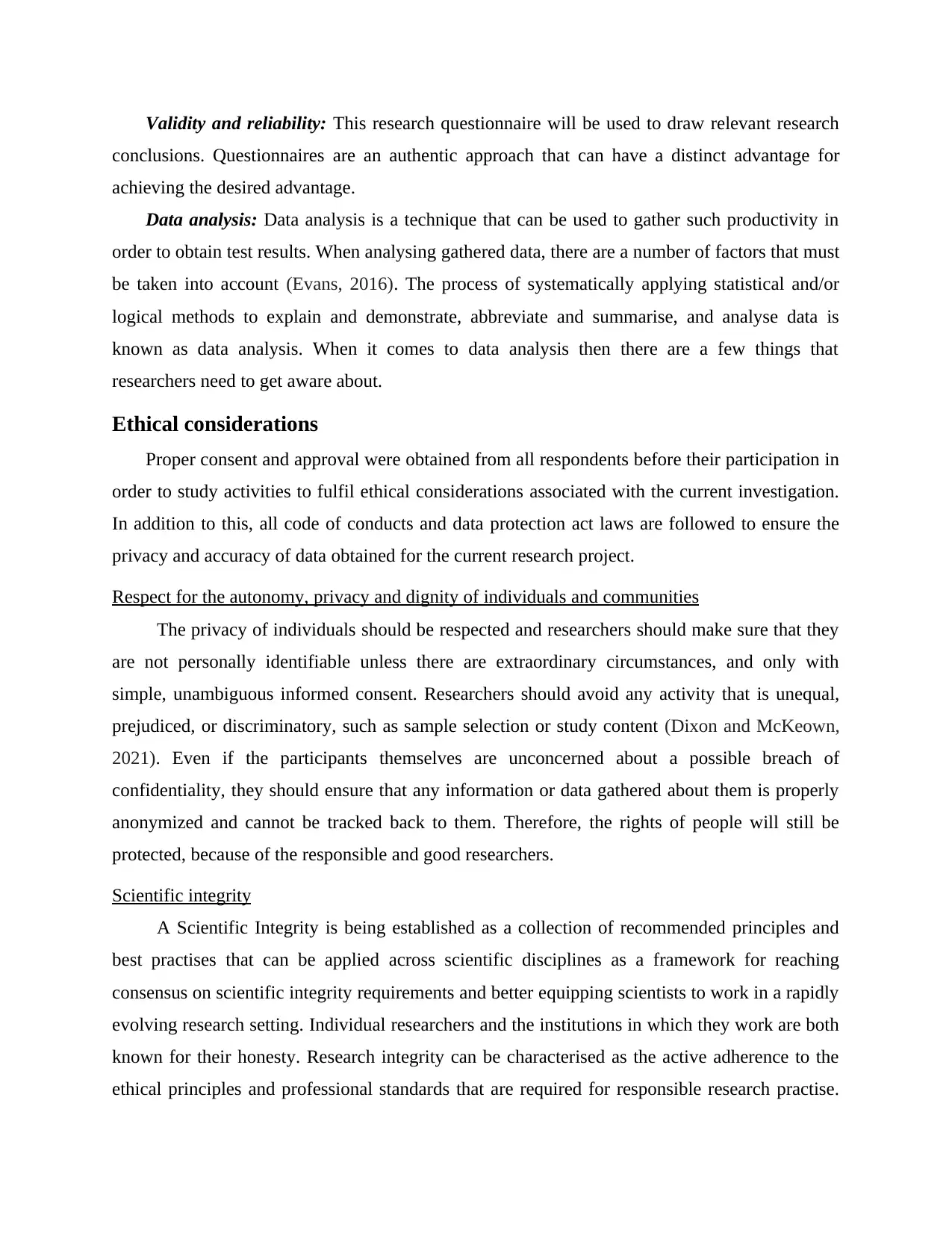
Validity and reliability: This research questionnaire will be used to draw relevant research
conclusions. Questionnaires are an authentic approach that can have a distinct advantage for
achieving the desired advantage.
Data analysis: Data analysis is a technique that can be used to gather such productivity in
order to obtain test results. When analysing gathered data, there are a number of factors that must
be taken into account (Evans, 2016). The process of systematically applying statistical and/or
logical methods to explain and demonstrate, abbreviate and summarise, and analyse data is
known as data analysis. When it comes to data analysis then there are a few things that
researchers need to get aware about.
Ethical considerations
Proper consent and approval were obtained from all respondents before their participation in
order to study activities to fulfil ethical considerations associated with the current investigation.
In addition to this, all code of conducts and data protection act laws are followed to ensure the
privacy and accuracy of data obtained for the current research project.
Respect for the autonomy, privacy and dignity of individuals and communities
The privacy of individuals should be respected and researchers should make sure that they
are not personally identifiable unless there are extraordinary circumstances, and only with
simple, unambiguous informed consent. Researchers should avoid any activity that is unequal,
prejudiced, or discriminatory, such as sample selection or study content (Dixon and McKeown,
2021). Even if the participants themselves are unconcerned about a possible breach of
confidentiality, they should ensure that any information or data gathered about them is properly
anonymized and cannot be tracked back to them. Therefore, the rights of people will still be
protected, because of the responsible and good researchers.
Scientific integrity
A Scientific Integrity is being established as a collection of recommended principles and
best practises that can be applied across scientific disciplines as a framework for reaching
consensus on scientific integrity requirements and better equipping scientists to work in a rapidly
evolving research setting. Individual researchers and the institutions in which they work are both
known for their honesty. Research integrity can be characterised as the active adherence to the
ethical principles and professional standards that are required for responsible research practise.
conclusions. Questionnaires are an authentic approach that can have a distinct advantage for
achieving the desired advantage.
Data analysis: Data analysis is a technique that can be used to gather such productivity in
order to obtain test results. When analysing gathered data, there are a number of factors that must
be taken into account (Evans, 2016). The process of systematically applying statistical and/or
logical methods to explain and demonstrate, abbreviate and summarise, and analyse data is
known as data analysis. When it comes to data analysis then there are a few things that
researchers need to get aware about.
Ethical considerations
Proper consent and approval were obtained from all respondents before their participation in
order to study activities to fulfil ethical considerations associated with the current investigation.
In addition to this, all code of conducts and data protection act laws are followed to ensure the
privacy and accuracy of data obtained for the current research project.
Respect for the autonomy, privacy and dignity of individuals and communities
The privacy of individuals should be respected and researchers should make sure that they
are not personally identifiable unless there are extraordinary circumstances, and only with
simple, unambiguous informed consent. Researchers should avoid any activity that is unequal,
prejudiced, or discriminatory, such as sample selection or study content (Dixon and McKeown,
2021). Even if the participants themselves are unconcerned about a possible breach of
confidentiality, they should ensure that any information or data gathered about them is properly
anonymized and cannot be tracked back to them. Therefore, the rights of people will still be
protected, because of the responsible and good researchers.
Scientific integrity
A Scientific Integrity is being established as a collection of recommended principles and
best practises that can be applied across scientific disciplines as a framework for reaching
consensus on scientific integrity requirements and better equipping scientists to work in a rapidly
evolving research setting. Individual researchers and the institutions in which they work are both
known for their honesty. Research integrity can be characterised as the active adherence to the
ethical principles and professional standards that are required for responsible research practise.
Secure Best Marks with AI Grader
Need help grading? Try our AI Grader for instant feedback on your assignments.
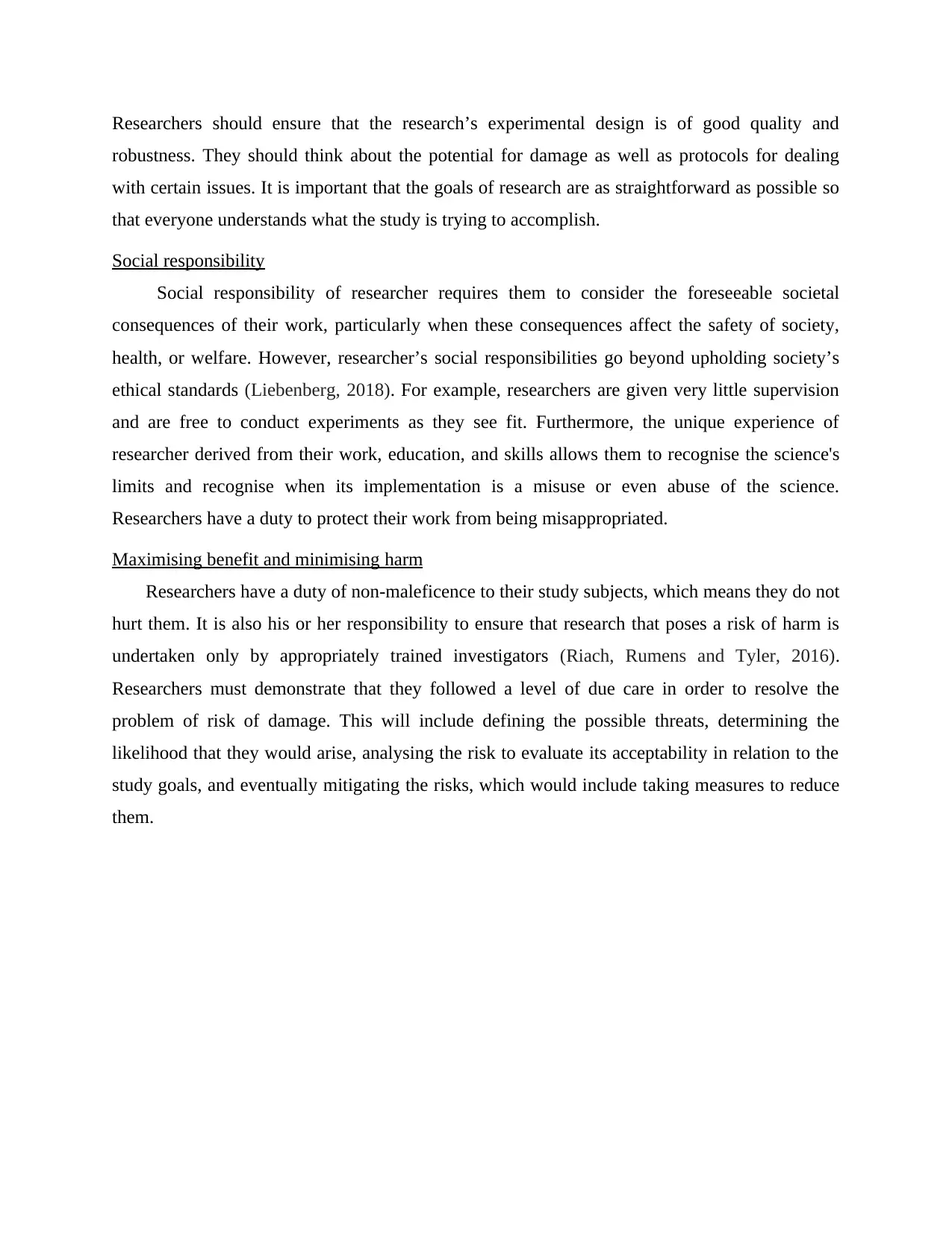
Researchers should ensure that the research’s experimental design is of good quality and
robustness. They should think about the potential for damage as well as protocols for dealing
with certain issues. It is important that the goals of research are as straightforward as possible so
that everyone understands what the study is trying to accomplish.
Social responsibility
Social responsibility of researcher requires them to consider the foreseeable societal
consequences of their work, particularly when these consequences affect the safety of society,
health, or welfare. However, researcher’s social responsibilities go beyond upholding society’s
ethical standards (Liebenberg, 2018). For example, researchers are given very little supervision
and are free to conduct experiments as they see fit. Furthermore, the unique experience of
researcher derived from their work, education, and skills allows them to recognise the science's
limits and recognise when its implementation is a misuse or even abuse of the science.
Researchers have a duty to protect their work from being misappropriated.
Maximising benefit and minimising harm
Researchers have a duty of non-maleficence to their study subjects, which means they do not
hurt them. It is also his or her responsibility to ensure that research that poses a risk of harm is
undertaken only by appropriately trained investigators (Riach, Rumens and Tyler, 2016).
Researchers must demonstrate that they followed a level of due care in order to resolve the
problem of risk of damage. This will include defining the possible threats, determining the
likelihood that they would arise, analysing the risk to evaluate its acceptability in relation to the
study goals, and eventually mitigating the risks, which would include taking measures to reduce
them.
robustness. They should think about the potential for damage as well as protocols for dealing
with certain issues. It is important that the goals of research are as straightforward as possible so
that everyone understands what the study is trying to accomplish.
Social responsibility
Social responsibility of researcher requires them to consider the foreseeable societal
consequences of their work, particularly when these consequences affect the safety of society,
health, or welfare. However, researcher’s social responsibilities go beyond upholding society’s
ethical standards (Liebenberg, 2018). For example, researchers are given very little supervision
and are free to conduct experiments as they see fit. Furthermore, the unique experience of
researcher derived from their work, education, and skills allows them to recognise the science's
limits and recognise when its implementation is a misuse or even abuse of the science.
Researchers have a duty to protect their work from being misappropriated.
Maximising benefit and minimising harm
Researchers have a duty of non-maleficence to their study subjects, which means they do not
hurt them. It is also his or her responsibility to ensure that research that poses a risk of harm is
undertaken only by appropriately trained investigators (Riach, Rumens and Tyler, 2016).
Researchers must demonstrate that they followed a level of due care in order to resolve the
problem of risk of damage. This will include defining the possible threats, determining the
likelihood that they would arise, analysing the risk to evaluate its acceptability in relation to the
study goals, and eventually mitigating the risks, which would include taking measures to reduce
them.
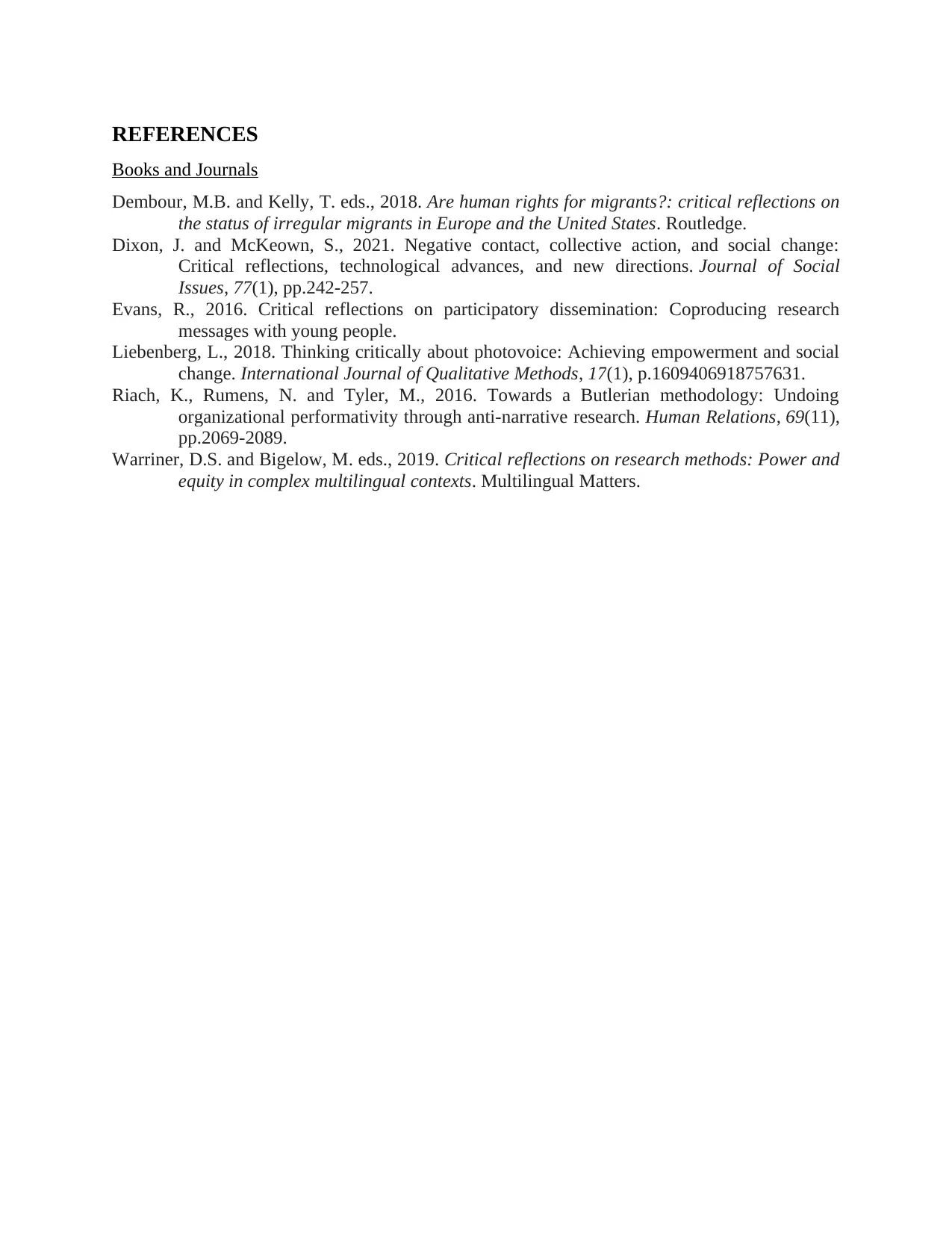
REFERENCES
Books and Journals
Dembour, M.B. and Kelly, T. eds., 2018. Are human rights for migrants?: critical reflections on
the status of irregular migrants in Europe and the United States. Routledge.
Dixon, J. and McKeown, S., 2021. Negative contact, collective action, and social change:
Critical reflections, technological advances, and new directions. Journal of Social
Issues, 77(1), pp.242-257.
Evans, R., 2016. Critical reflections on participatory dissemination: Coproducing research
messages with young people.
Liebenberg, L., 2018. Thinking critically about photovoice: Achieving empowerment and social
change. International Journal of Qualitative Methods, 17(1), p.1609406918757631.
Riach, K., Rumens, N. and Tyler, M., 2016. Towards a Butlerian methodology: Undoing
organizational performativity through anti-narrative research. Human Relations, 69(11),
pp.2069-2089.
Warriner, D.S. and Bigelow, M. eds., 2019. Critical reflections on research methods: Power and
equity in complex multilingual contexts. Multilingual Matters.
Books and Journals
Dembour, M.B. and Kelly, T. eds., 2018. Are human rights for migrants?: critical reflections on
the status of irregular migrants in Europe and the United States. Routledge.
Dixon, J. and McKeown, S., 2021. Negative contact, collective action, and social change:
Critical reflections, technological advances, and new directions. Journal of Social
Issues, 77(1), pp.242-257.
Evans, R., 2016. Critical reflections on participatory dissemination: Coproducing research
messages with young people.
Liebenberg, L., 2018. Thinking critically about photovoice: Achieving empowerment and social
change. International Journal of Qualitative Methods, 17(1), p.1609406918757631.
Riach, K., Rumens, N. and Tyler, M., 2016. Towards a Butlerian methodology: Undoing
organizational performativity through anti-narrative research. Human Relations, 69(11),
pp.2069-2089.
Warriner, D.S. and Bigelow, M. eds., 2019. Critical reflections on research methods: Power and
equity in complex multilingual contexts. Multilingual Matters.
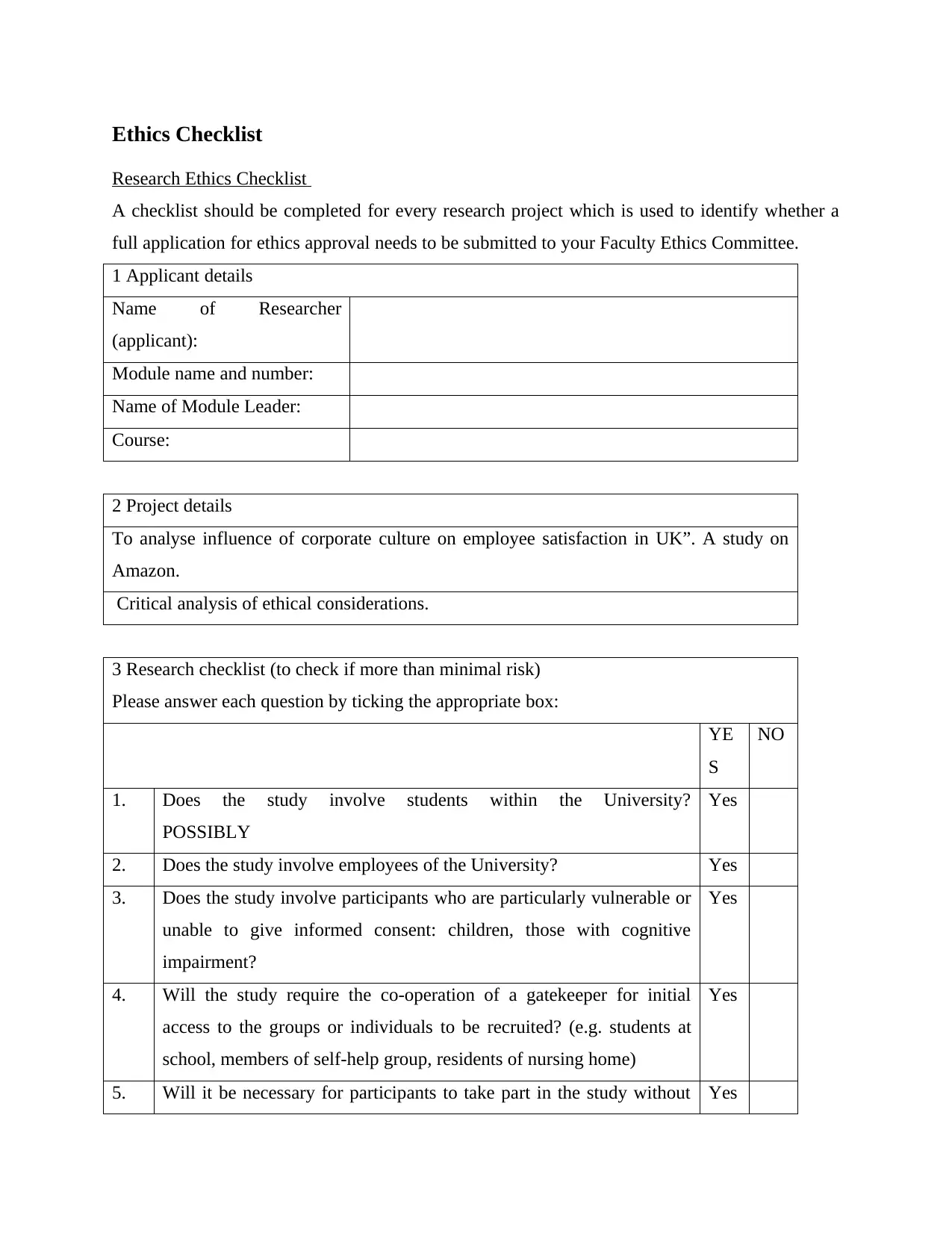
Ethics Checklist
Research Ethics Checklist
A checklist should be completed for every research project which is used to identify whether a
full application for ethics approval needs to be submitted to your Faculty Ethics Committee.
1 Applicant details
Name of Researcher
(applicant):
Module name and number:
Name of Module Leader:
Course:
2 Project details
To analyse influence of corporate culture on employee satisfaction in UK”. A study on
Amazon.
Critical analysis of ethical considerations.
3 Research checklist (to check if more than minimal risk)
Please answer each question by ticking the appropriate box:
YE
S
NO
1. Does the study involve students within the University?
POSSIBLY
Yes
2. Does the study involve employees of the University? Yes
3. Does the study involve participants who are particularly vulnerable or
unable to give informed consent: children, those with cognitive
impairment?
Yes
4. Will the study require the co-operation of a gatekeeper for initial
access to the groups or individuals to be recruited? (e.g. students at
school, members of self-help group, residents of nursing home)
Yes
5. Will it be necessary for participants to take part in the study without Yes
Research Ethics Checklist
A checklist should be completed for every research project which is used to identify whether a
full application for ethics approval needs to be submitted to your Faculty Ethics Committee.
1 Applicant details
Name of Researcher
(applicant):
Module name and number:
Name of Module Leader:
Course:
2 Project details
To analyse influence of corporate culture on employee satisfaction in UK”. A study on
Amazon.
Critical analysis of ethical considerations.
3 Research checklist (to check if more than minimal risk)
Please answer each question by ticking the appropriate box:
YE
S
NO
1. Does the study involve students within the University?
POSSIBLY
Yes
2. Does the study involve employees of the University? Yes
3. Does the study involve participants who are particularly vulnerable or
unable to give informed consent: children, those with cognitive
impairment?
Yes
4. Will the study require the co-operation of a gatekeeper for initial
access to the groups or individuals to be recruited? (e.g. students at
school, members of self-help group, residents of nursing home)
Yes
5. Will it be necessary for participants to take part in the study without Yes
Paraphrase This Document
Need a fresh take? Get an instant paraphrase of this document with our AI Paraphraser
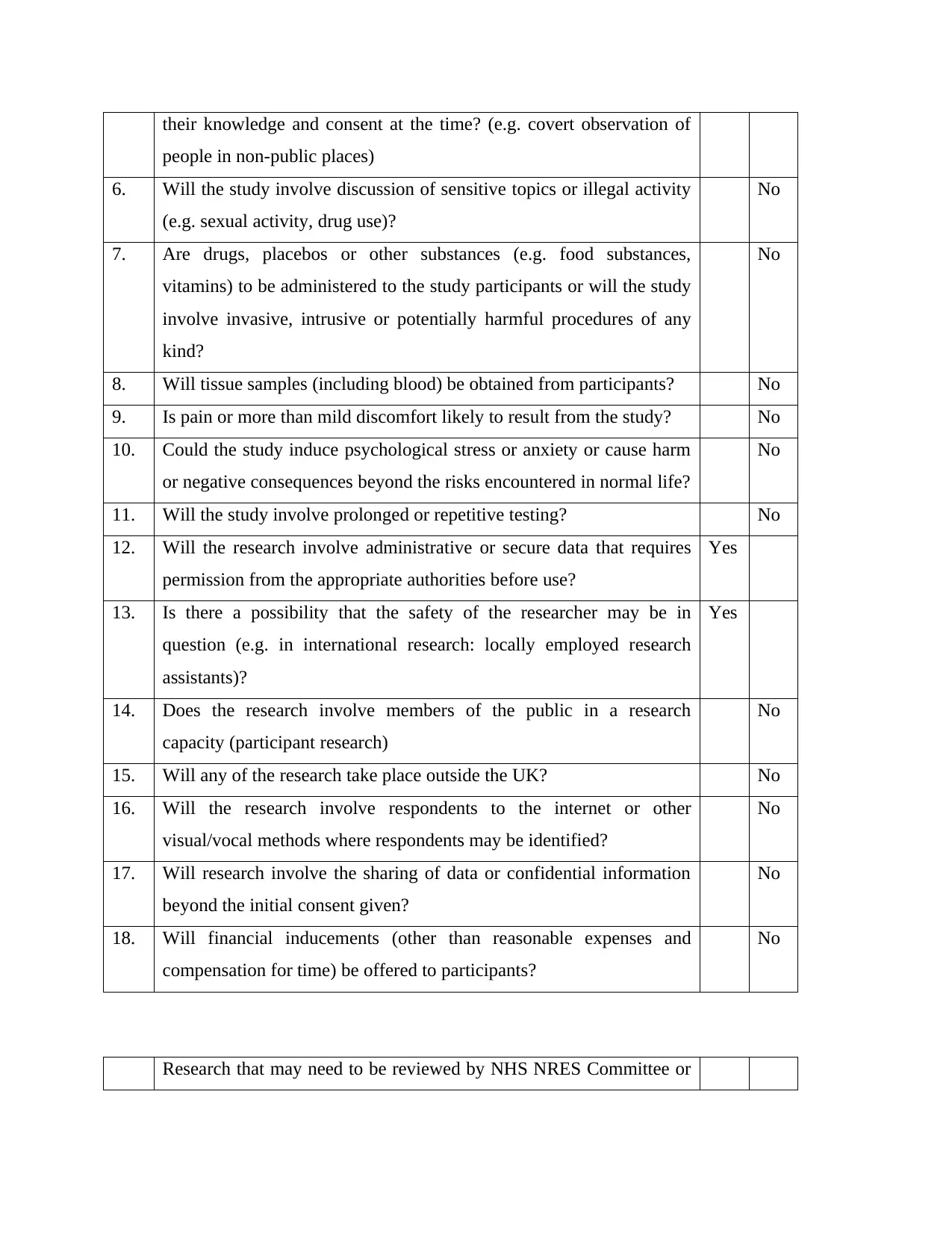
their knowledge and consent at the time? (e.g. covert observation of
people in non-public places)
6. Will the study involve discussion of sensitive topics or illegal activity
(e.g. sexual activity, drug use)?
No
7. Are drugs, placebos or other substances (e.g. food substances,
vitamins) to be administered to the study participants or will the study
involve invasive, intrusive or potentially harmful procedures of any
kind?
No
8. Will tissue samples (including blood) be obtained from participants? No
9. Is pain or more than mild discomfort likely to result from the study? No
10. Could the study induce psychological stress or anxiety or cause harm
or negative consequences beyond the risks encountered in normal life?
No
11. Will the study involve prolonged or repetitive testing? No
12. Will the research involve administrative or secure data that requires
permission from the appropriate authorities before use?
Yes
13. Is there a possibility that the safety of the researcher may be in
question (e.g. in international research: locally employed research
assistants)?
Yes
14. Does the research involve members of the public in a research
capacity (participant research)
No
15. Will any of the research take place outside the UK? No
16. Will the research involve respondents to the internet or other
visual/vocal methods where respondents may be identified?
No
17. Will research involve the sharing of data or confidential information
beyond the initial consent given?
No
18. Will financial inducements (other than reasonable expenses and
compensation for time) be offered to participants?
No
Research that may need to be reviewed by NHS NRES Committee or
people in non-public places)
6. Will the study involve discussion of sensitive topics or illegal activity
(e.g. sexual activity, drug use)?
No
7. Are drugs, placebos or other substances (e.g. food substances,
vitamins) to be administered to the study participants or will the study
involve invasive, intrusive or potentially harmful procedures of any
kind?
No
8. Will tissue samples (including blood) be obtained from participants? No
9. Is pain or more than mild discomfort likely to result from the study? No
10. Could the study induce psychological stress or anxiety or cause harm
or negative consequences beyond the risks encountered in normal life?
No
11. Will the study involve prolonged or repetitive testing? No
12. Will the research involve administrative or secure data that requires
permission from the appropriate authorities before use?
Yes
13. Is there a possibility that the safety of the researcher may be in
question (e.g. in international research: locally employed research
assistants)?
Yes
14. Does the research involve members of the public in a research
capacity (participant research)
No
15. Will any of the research take place outside the UK? No
16. Will the research involve respondents to the internet or other
visual/vocal methods where respondents may be identified?
No
17. Will research involve the sharing of data or confidential information
beyond the initial consent given?
No
18. Will financial inducements (other than reasonable expenses and
compensation for time) be offered to participants?
No
Research that may need to be reviewed by NHS NRES Committee or
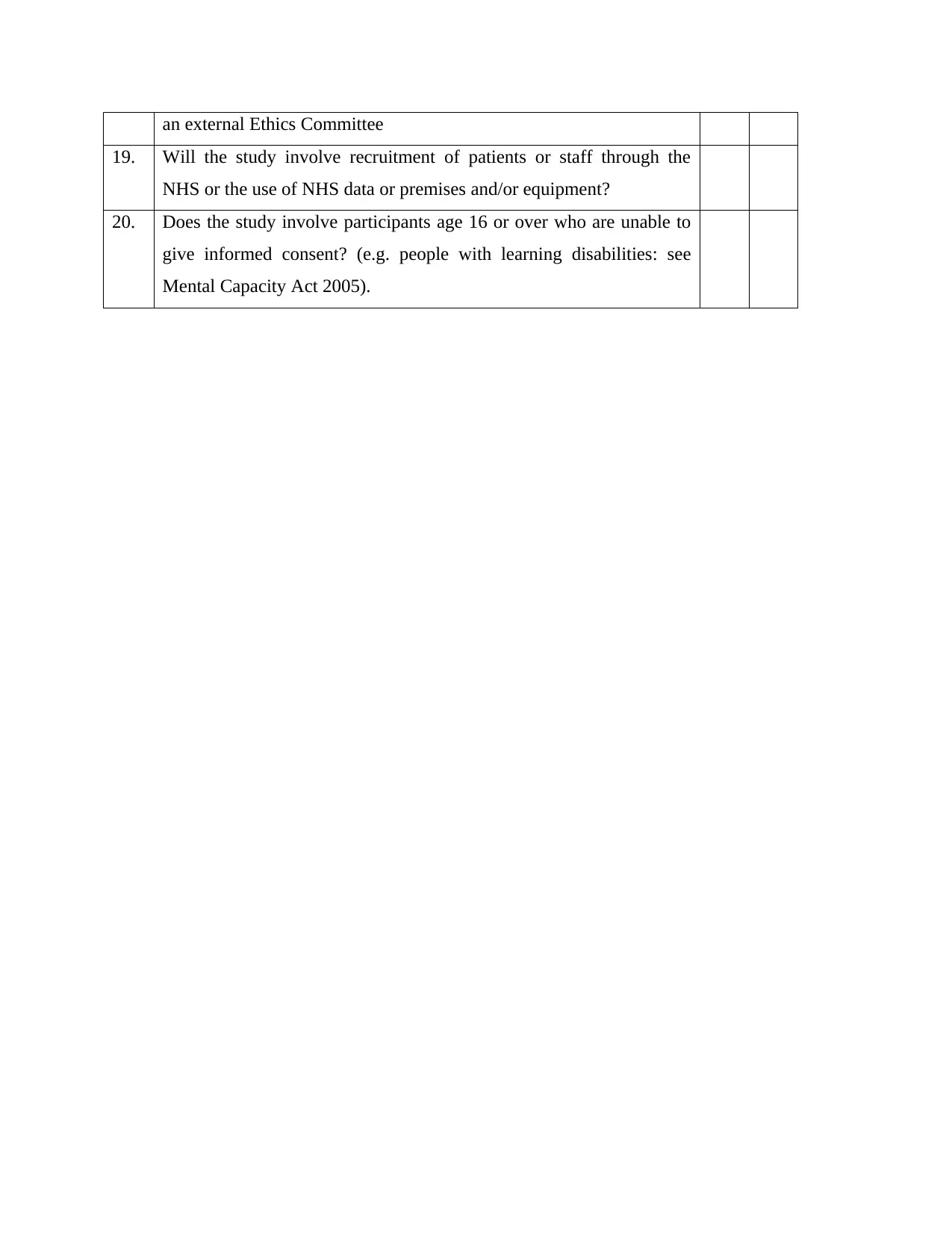
an external Ethics Committee
19. Will the study involve recruitment of patients or staff through the
NHS or the use of NHS data or premises and/or equipment?
20. Does the study involve participants age 16 or over who are unable to
give informed consent? (e.g. people with learning disabilities: see
Mental Capacity Act 2005).
19. Will the study involve recruitment of patients or staff through the
NHS or the use of NHS data or premises and/or equipment?
20. Does the study involve participants age 16 or over who are unable to
give informed consent? (e.g. people with learning disabilities: see
Mental Capacity Act 2005).
1 out of 9
Related Documents
Your All-in-One AI-Powered Toolkit for Academic Success.
+13062052269
info@desklib.com
Available 24*7 on WhatsApp / Email
![[object Object]](/_next/static/media/star-bottom.7253800d.svg)
Unlock your academic potential
© 2024 | Zucol Services PVT LTD | All rights reserved.





